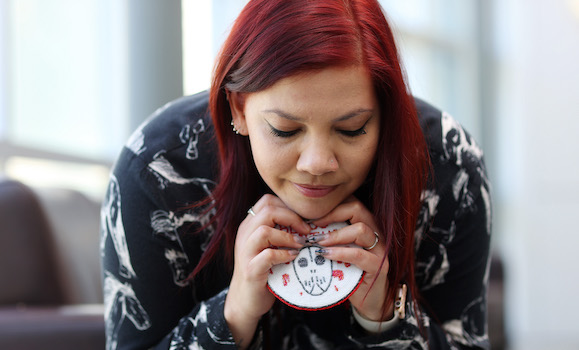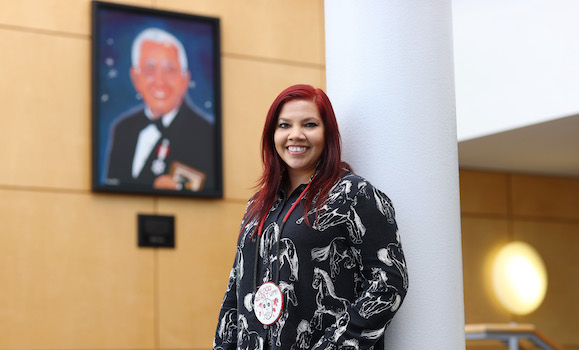This article is part of a series focusing on the grads of the Dalhousie Class of 2024. Spring Convocation runs from May 21 to 31 in Halifax and Truro. Read all our profiles here in one place as they are published, and for more information visit the Convocation website.
Krista Collier-Jarvis’s fascination with scary stories began in childhood when she and her mom used to spend time together watching horror movies.
“My work always comes back to horror. It’s comforting and nostalgic to me,” explains Krista. “When I found out I could study it full time, it was like a dream come true.”
Krista completed a BA Honours degree in English from Mount Saint Vincent University (2013) and a Master’s in English from Dal (2016), working after each degree for a time but always feeling pulled back to academia. She graduates from Dal this spring with a Doctor of Philosophy in English.
Having grown up in Truro, Nova Scotia, on the edge of the Millbrook First Nation, Krista’s own life experiences also became an inspiration for how she would approach her research throughout her degrees when she began learning to connect with her Mi’kmaq heritage. She started researching Indigenous Gothic, popular culture, museology, and creative approaches to trauma, while keeping her fascination for horror alive.
Krista became so enamoured with zombie culture specifically that she decided to focus her PhD dissertation on the fragmentation of contemporary zombie narratives and how these stories can help us better understand living with contagion.
Her fascination in zombie media was ignited when she discovered The Walking Dead series and her research really gained purchase with the release of Jeff Barnaby’s (Mi’kmaw) Indigenous zombie film, Blood Quantum, a movie about Indigenous (Mi’kmaq) peoples that were immune to the zombie pathogen.
“Barnaby’s film is not the first of its kind, but the fact that it’s rooted in the context of Mi’kmaq history and culture and storytelling speaks to me personally,” says Krista. “The inclusion of racial-based immunity more explicitly rooted the film within conversations of contagion but also our misunderstandings of Indigenous identity.”

Publishing and public speaking
With the outbreak of COVID-19 shortly thereafter, Krista says the zombie subgenre revealed itself to carry even more possibilities.
“As the pandemic went on, my research responded by addressing Black representation in zombie literature and film in response to the Black Lives Matter movement as well as climate issues in response to the rise of medical waste and seemingly adverse environmental disasters. It turns out that the zombie is more multi-faceted than even I initially believed, and we can learn much from zombie media.”
Krista had the opportunity to share her research and work explaining what zombie narratives can tell us about contagion as part of the Dalhousie OpenThink 2022 cohort. She had three articles published in The Conversation, one of which led to her being invited to speak (virtually) to groups of students at the University of British Columbia about the potential for storytelling to be used as a decolonial tool and she was twice invited to speak at Hal-Con, Halifax’s Sci-Fi & Fantasy Convention.
“Zombies keep returning, so to speak. We think we’ve laid them to rest, and then suddenly, there’s another film, TV show, novel, comic book, and even pop songs have begun to take up the figure. So, if zombies can’t rest, then neither can zombie scholars,” she says.
Additionally, her participation in other international conferences and research initiatives have provided her a multitude of networking and travel opportunities.
“From Iqaluit to Poland to California to, most recently, Scotland. I cannot possibly express enough gratitude for my mentors, my funding agencies, and the many organizations that have made space for me to share my work.”
Krista also made the 2023 CBC Nonfiction Prize longlist for her work, A Micmac Memoir.

Krista stands near a portrait of Elder Daniel Paul that hangs in the Marion McCain Building on Studley Campus. The portrait was painted by Mi'kmaw artist Alan Syliboy.
Professional progress
Krista was hired recently as a tenure track faculty member in MSVU’s English department, returning to the campus where her love of storytelling and academic research was first sparked.
“I spent the past year balancing life as a full-time graduate student and a full-time assistant professor. Don’t ask me how I accomplished this. I am extremely grateful and could not have achieved it on my own,” she says.
Faculty members who contributed to making her experiences as a graduate student at Dal meaningful include her PhD supervisor, Dr. Jason Haslam (of the English department), Dr. Karen Macfarlane (of MSVU’s English department), Dr. Margaret Robinson (Indigenous Studies coordinator and associate professor in the departments of English and Sociology & Social Anthropology), and Dr. Dorota Glowacka (University of King’s College faculty member with cross-appointment to FASS at Dal) who Krista worked with as a Research Assistant on developing “Trauma, Memory, and Material Culture: NMAI and USHMM in dialogue,” the first ever workshop that brought together the National Museum of the American Indian and the United States Holocaust Memorial Museum.
Because she knew she wanted to be a professor, Krista also took advantage of every possible opportunity to participate in workshops, professional development sessions, and talks at Dal related to teaching, leadership, and EDIA.
And to the current and future graduate students, Krista offers the following advice:
“Trust your voice and don’t be afraid to take chances. Many of my accomplishments come from facing scary situations and going through with things anyway. If you made it here, it’s because your research is important and your perspective is crucial, so don’t ever forget that.”


